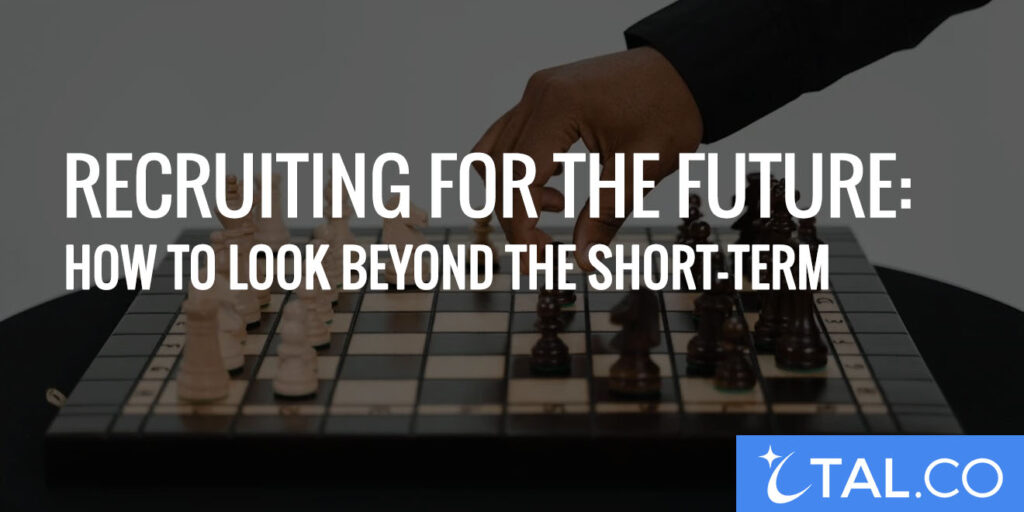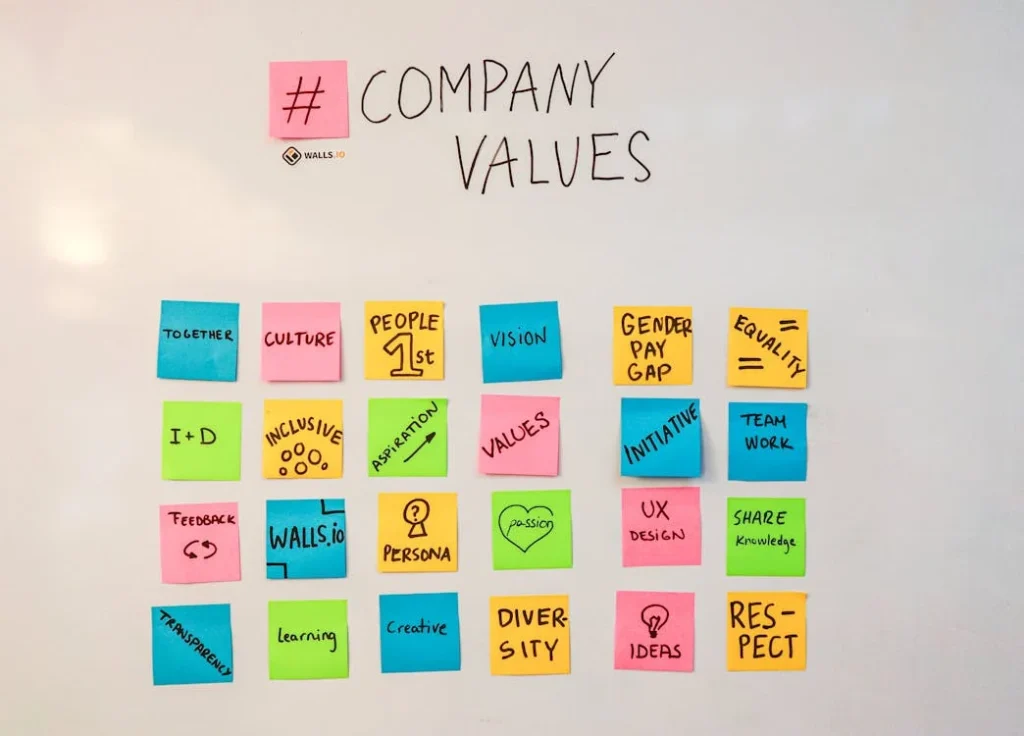
Recruiting for the Future: How to Look Beyond the Short-Term
If you’re only hiring to fill seats today, you’re missing the bigger picture.
Short-term hiring solves immediate problems, but it doesn’t position your company to thrive long-term.
What you really want is a team that grows with you — one that evolves alongside your vision, adapts to new challenges, and helps your company reach milestones you haven’t even imagined yet.
That kind of team doesn’t happen by accident. It happens when you recruit with the future in mind.
But here’s the deal…
Future-focused recruiting isn’t always about qualifications or experience. Instead, it’s about potential.
It’s about identifying the kinds of people who will still be adding value to your business two, five, or even ten years from now — not just checking boxes during the interview.
So how do you shift your mindset? How do you build a recruiting process that goes beyond the short-term needs and focuses on long-term growth?
Let’s walk through the strategies together.
Outline
1. Start Hiring for Adaptability
It’s easy to get caught up in years of experience, job titles, and degrees. But if that’s all you’re looking at, you’re evaluating the past instead of the future.
What you want to understand is how someone thinks, learns, pivots, etc. Because no matter what role you’re hiring for today, it’s going to change.
The tools will change. The challenges will evolve. And the job description you’re writing now might be outdated in 18 months.
Instead of asking, “What have you done?” start asking:
- How do you respond to failure?
- What’s something new you’ve learned recently, and how?
- Can you describe a time when you had to adapt to a major change?
You’re looking for growth-minded people who can thrive in uncertainty — not just those who can repeat what they’ve already done.
2. Hire People Who Understand Systems, Not Just Tasks
When you’re trying to scale, you need more than task-rabbits. You need people who understand how the whole system fits together.
Let’s say you’re hiring a marketing coordinator. You could focus on whether they’ve used your specific email platform or edited landing pages. Or, you could dig deeper and find out whether they understand how campaigns interact with sales, how lead gen ties to retention, or how a small change in messaging can ripple through the customer journey.
People who understand systems tend to ask better questions. They don’t just complete assignments — they improve them. And when roles expand (or when they’re asked to lead), they’re already thinking in terms of processes and outcomes.
3. Look for Values Alignment (Not Just Culture Fit)

You’ve probably heard the phrase “hire for culture fit” — but what does that even mean? Too often, it gets reduced to “Do I like this person?” or “Would I grab a drink with them after work?”
Instead, you should be looking for values alignment. Does this person care about the same kinds of things your company prioritizes? Do they approach decisions with similar guiding principles? Are they mission-driven?
When someone shares your values, they’re more likely to weather the ups and downs with you. They make decisions that move the company forward. And they help reinforce a strong, stable company culture — one that doesn’t have to be micromanaged into existence.
4. Invest in Career Development as Part of the Pitch
Future-focused hiring isn’t just about what candidates bring to you — it’s about what you offer them. High-potential talent wants to know where this opportunity can take them.
If you’re not talking about that during the interview process, you’re already behind.
Instead of just describing the role, paint a picture of what growth could look like.
- Talk about internal mobility during these conversations.
- Share stories of team members who started in one department and ended up leading another.
- Explain how your company supports upskilling, mentorship, or leadership development.
When you invest in a candidate’s future, they start to envision a future with you. And that mindset alone can improve retention and engagement before day one.
5. Use Behavioral Interviewing to Spot Long-Term Potential
Traditional interviews tend to focus on hypotheticals: “What would you do if…?” But hypothetical answers are rehearsed. They don’t show you how someone actually behaves under pressure or adapts in real life.
Behavioral interviewing flips the script. You ask candidates to walk you through real experiences and discuss what happened, what they did, and what the outcome was.
Try asking thinks like:
- “Tell me about a time when you didn’t know how to do something and had to figure it out.”
- “Describe a project that didn’t go according to plan. What did you do next?”
- “Can you share a situation where you received feedback that changed how you worked?”
These kinds of questions surface real traits like resilience, curiosity, collaboration, and problem-solving (all of which are essential for long-term success).
6. Recruit for Range, Not Just Specificity
You might think you need a “perfect fit” for a specific role. But what you really need is someone who can grow into a role — or even help you shape what that role becomes.
When you recruit for range, you look for candidates with diverse skill sets, interests outside of work, or cross-functional experience. Maybe they’ve worked in two or three different industries. Maybe they’ve worn a lot of hats at a startup. Or perhaps they bring a unique combination of creative and analytical thinking.
People with range tend to bring new ideas and step up when the unexpected happens. And in a world that’s always shifting, that flexibility is one of your greatest assets.
7. Create a Hiring Process That Reflects Your Long-Term Vision
If your application process feels dated, your candidates assume your company is too. The way you hire tells people what kind of company you are — even if you never say it directly.
If you’re serious about recruiting for the future, your process should reflect that. This means:
- Clear, well-written job descriptions that show thoughtfulness and professionalism.
- A smooth application experience that respects candidates’ time.
- Communication that’s honest, respectful, and responsive.
8. Hire for Tomorrow’s Organizational Chart
If you’re only hiring based on today’s structure, you’re building a team that fits today’s problems.
But what about the next phase of growth?
Think about what your business will need six, 12, or 18 months from now. Will you need more strategic thinking? Better systems? Stronger customer retention? International expansion?
Start sourcing talent that can help you scale — not just survive the quarter. Even if someone starts in an entry-level role, they should have the raw materials to grow with the business.
It’s much cheaper (and more sustainable) to grow your next leaders from within than to hire them all from the outside later.
9. Rethink What “Experience” Actually Means
Experience isn’t always linear. The best future hires may not check all the boxes you think you need.
They might not have the exact degree. In fact, they might come from a different industry or be self-taught.
But if they’ve built something, led something, or consistently created value — that matters.
Look for outcomes, not just titles. Look for grit, not just credentials. (Are you starting to understand how the recruiting thought process goes?)
Always remember that curiosity, work ethic, and emotional intelligence are often better indicators of success than a traditional resume.
10. Build a Talent Pipeline Before You Need It
If you’re waiting until a role is open to start looking for candidates, you’re already behind. Reactive hiring limits your choices and puts pressure on your team to make fast decisions — which often leads to costly mistakes.
Instead, think of recruiting like relationship-building. You want to be connecting with potential candidates before you ever post a job. That might mean staying active on LinkedIn, engaging with people at industry events, building referral programs, or simply maintaining regular contact with standout applicants who weren’t a fit yet.
Consistently nurturing your network helps you create a warm pipeline of future hires who already understand your brand and values. That means faster hires, better matches, and less panic when someone leaves unexpectedly.
Think of it this way: If your company is growing, hiring will never really stop. So instead of treating it like a one-time event, build it into your ongoing strategy.
You’ll be grateful you did.
Start Building a Foundation
Short-term hiring is like plugging leaks in a boat. It keeps you afloat, but it doesn’t help you go faster or farther.
If you want to build a team that drives real growth, you need to zoom out. Look past the next 90 days. Ask better questions and create a recruiting process that reflects your company’s future.
When you start hiring for potential, not just proficiency… when you prioritize alignment over convenience… when you build a process that respects people and supports their growth…
That’s when you stop reacting. And start leading.
Because the best teams aren’t just built for right now. They’re built for what’s next. And if you get recruiting right, your future gets a whole lot clearer.
At Tal.co, we’d love to help you build a future-oriented recruitment pipeline that helps your business grow for many years to come. Contact us today to get started!

